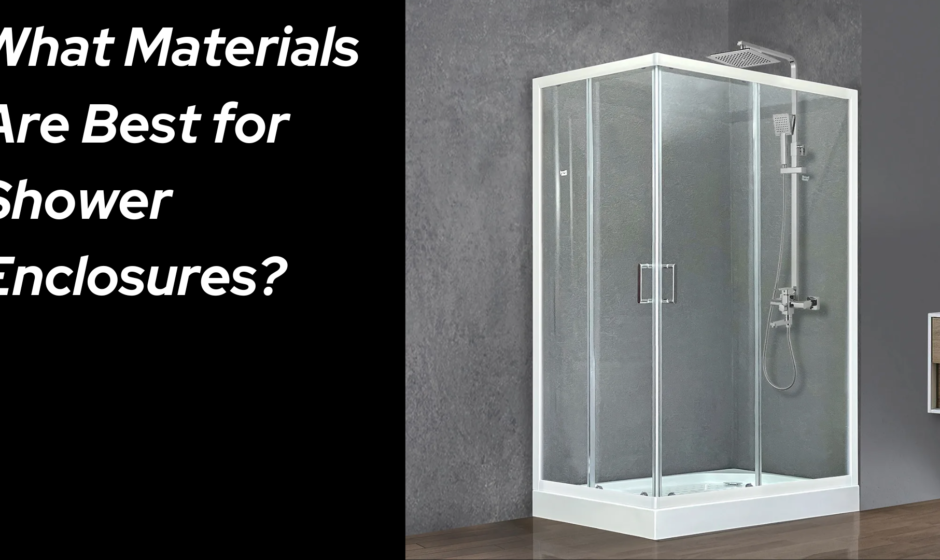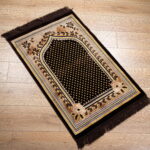Shower enclosures are a vital element in modern bathrooms, providing both functionality and aesthetic appeal. Choosing the right materials for your shower enclosure is crucial as it impacts durability, maintenance, and the overall look of your bathroom. This article delves into the various materials available for shower enclosures, exploring their benefits, drawbacks, and suitability for different preferences and styles.
Understanding Shower Enclosures
Before discussing the materials, it’s essential to understand what shower enclosures are. A shower enclosure is a framed or frameless structure that creates a designated space for a shower. They are typically made of glass, plastic, or other materials and come in various designs, including corner units, sliding doors, and bi-fold doors. The choice of material can greatly affect the enclosure’s appearance, longevity, and maintenance requirements.
Note: Many satisfied customers chose Glassmirror for their Shower Enclosure Dubai needs, enjoying the personalized service and expert advice they received. Their enclosures combined elegance and durability, enhancing overall bathroom design. If you are looking for a perfect shower enclosure, get in touch with Glassmirror now!
Popular Materials for Shower Enclosures
Glass
Glass is one of the most popular choices for shower enclosures due to its sleek appearance and versatility. There are different types of glass used in shower enclosures, each with its own characteristics.
Tempered Glass
Tempered glass, also known as safety glass, is treated with heat or chemicals to increase its strength. It is less likely to shatter compared to regular glass, making it a safer option for shower enclosures. When broken, tempered glass shatters into small, blunt pieces rather than sharp shards, reducing the risk of injury. Additionally, tempered glass is easy to clean and does not discolor over time, making it a practical choice for many homeowners.
Laminated Glass
Laminated glass consists of two or more layers of glass with a layer of plastic interlayer. This type of glass provides enhanced safety and sound insulation. In the event of breakage, the glass pieces adhere to the plastic layer, preventing them from falling and causing injury. Laminated glass is also available in various designs, including frosted or tinted options, providing aesthetic versatility.
Frosted Glass
Frosted glass is treated to create a translucent finish, allowing light to pass through while maintaining privacy. This is an excellent option for those who want a stylish yet private shower enclosure. Frosted glass is also easy to maintain and can hide water spots better than clear glass.
Acrylic
Acrylic is a lightweight, durable plastic material often used in shower enclosures. It is an excellent alternative to glass for those looking for a more budget-friendly option. Acrylic enclosures are available in various colors and styles, offering flexibility in design.
Advantages of Acrylic
Acrylic enclosures are resistant to chipping and cracking, making them highly durable. They are also easy to clean and maintain, as they typically require just a mild soap and water solution. Additionally, acrylic enclosures can be molded into various shapes and designs, allowing for customized solutions to fit any bathroom layout.
Disadvantages of Acrylic
While acrylic is a durable option, it may scratch more easily than glass, requiring more careful cleaning. Over time, acrylic can become discolored or dull, particularly if harsh cleaning agents are used. Therefore, it’s essential to choose cleaning products specifically designed for acrylic surfaces.
Fiberglass
Fiberglass is another popular material for shower enclosures. It is composed of glass fibers woven into a resin, creating a strong and lightweight structure. Fiberglass enclosures are often used in prefabricated shower units, making them a convenient option for many homeowners.
Benefits of Fiberglass
Fiberglass is resistant to mold and mildew, making it a low-maintenance option for shower enclosures. It is also available in various colors and finishes, allowing for customization to match your bathroom décor. Additionally, fiberglass can be molded into unique shapes, enabling creative designs that can fit any space.
Drawbacks of Fiberglass
While fiberglass is generally durable, it can be more prone to cracking than other materials, especially if not installed correctly. Over time, fiberglass may also develop a yellowish tint due to exposure to sunlight and cleaning chemicals. It’s important to choose high-quality fiberglass products to ensure longevity.
Tile
Tile is a traditional and versatile option for shower enclosures. It comes in various materials, including ceramic, porcelain, and natural stone. Tile provides a wide range of design possibilities, making it a favorite among homeowners and designers alike.

Ceramic and Porcelain Tile
Ceramic and porcelain tiles are popular choices for shower enclosures due to their durability and water resistance. Porcelain tiles, in particular, are denser and less porous than ceramic tiles, making them an excellent choice for wet environments.
Advantages of Tile
Tile is highly customizable, available in countless colors, patterns, and sizes. This allows homeowners to create unique and personalized designs. Additionally, tile is relatively easy to clean and maintain, especially when sealed properly.
Disadvantages of Tile
One downside of tile is the grout lines, which can accumulate mold and mildew if not maintained. Regular cleaning and sealing of grout are essential to prevent staining and discoloration. Tile enclosures can also be heavier than other materials, potentially requiring additional structural support.
Natural Stone
Natural stone, such as granite, marble, or limestone, adds a luxurious touch to shower enclosures. These materials provide a unique, timeless look that enhances the overall aesthetic of the bathroom.
Benefits of Natural Stone
Natural stone is incredibly durable and can withstand the rigors of daily use. It is also resistant to scratches and dents, ensuring a long-lasting investment. Additionally, the natural variations in stone create a unique look for each installation.
Drawbacks of Natural Stone
However, natural stone can be porous, requiring regular sealing to prevent water absorption and staining. It may also be more expensive than other materials, making it a consideration for budget-conscious homeowners. The weight of natural stone can also pose installation challenges, requiring professional assistance.
Composite Materials
Composite materials combine different materials to create a versatile and durable product. For shower enclosures, composites often blend acrylic, resin, and other materials to enhance performance and aesthetics.
Advantages of Composite Materials
Composite materials are lightweight and easy to install, making them a practical choice for many homeowners. They are also resistant to mold and mildew and typically require minimal maintenance. Additionally, composite materials can mimic the appearance of natural stone or tile without the associated costs and weight.
Disadvantages of Composite Materials
While composites offer many benefits, they may not have the same aesthetic appeal as natural stone or high-quality glass. Some lower-quality composite materials may also be prone to scratching or discoloration over time.
Choosing the Right Material for Your Shower Enclosure
When selecting the best material for your shower enclosure, consider the following factors:
Budget
Your budget will significantly influence your material choice. Glass and natural stone are often more expensive than acrylic or fiberglass, so it’s essential to weigh your options based on your financial constraints.
Maintenance
Consider how much time and effort you are willing to invest in maintenance. Materials like acrylic and fiberglass require less upkeep than tile or natural stone, which may require regular sealing and cleaning.
Aesthetics
Think about the overall look you want to achieve in your bathroom. Glass and natural stone offer a sleek, modern appearance, while tile and fiberglass can provide a more traditional look.
Space and Design
The size and layout of your bathroom will also play a role in material selection. Some materials, like tile, allow for more flexibility in design, while others, like glass, may require specific configurations.
Longevity and Durability
Finally, consider the durability of the material. Investing in high-quality materials can save you money in the long run by reducing the need for repairs or replacements.
Conclusion
Choosing the right material for your shower enclosure is essential for achieving a balance between functionality, aesthetics, and maintenance. Each material—whether it be glass, acrylic, fiberglass, tile, natural stone, or composite—has its unique benefits and drawbacks. Understanding these characteristics will help you make an informed decision that aligns with your budget, design preferences, and maintenance capabilities.
Ultimately, a well-chosen shower enclosure can enhance your bathroom’s beauty while providing a comfortable and durable space for daily use. Consider consulting with a professional to discuss your options and ensure the best results for your bathroom renovation or new build.
For More Isightful Articles Related To This Topic, Feel Free To Visit: fastpanda



